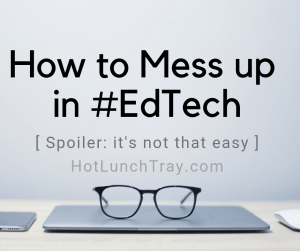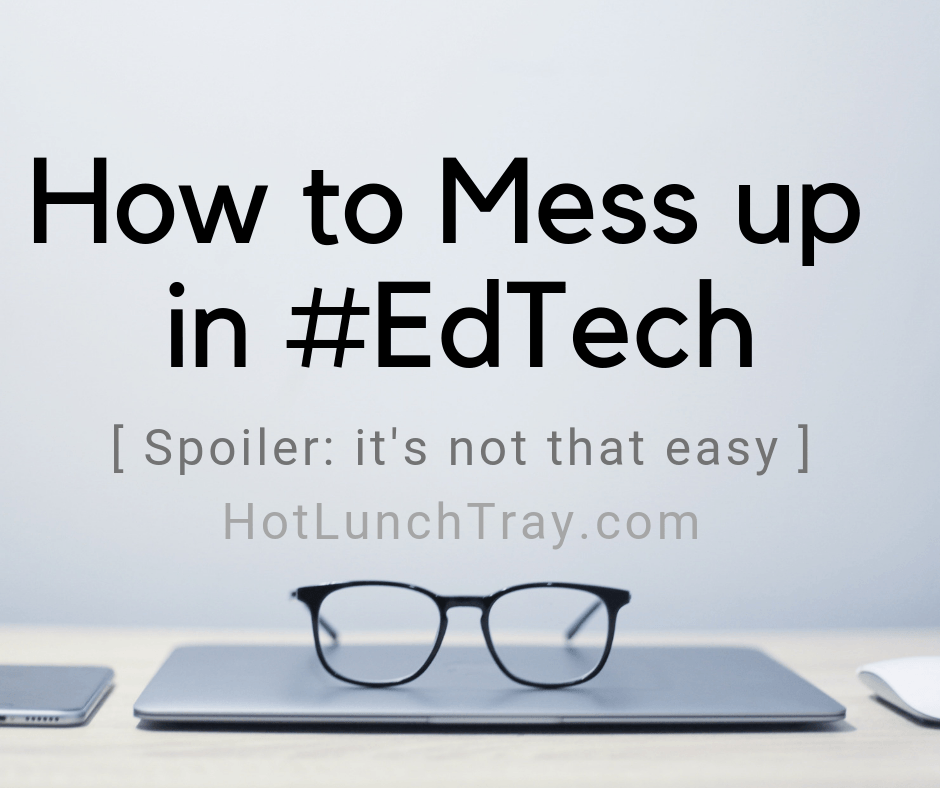I don’t mean to pull rank on anyone. However, I am semi-professional at how one might mess up in #EdTech. While I could share some tales (read: ALL the tales) about my mistakes I want to instead take a step back. Let’s look at what is really is going on in educational technology and how we are or are not messing up.
Educational Technology is the youngest sibling in the educational family. #EdTech is not new, but the youngest tool in an educator’s tool belt. Typically there exists a subset of educators who identify as #edTech. So it is newer and it is a smaller group too. And many small, new educational communities experience a trial period. Teachers outside that group may watch to see how those within fare; are they doing their job better, or easier, or quicker?
Transparency
Technology by its nature creates transparency. Education is an event most of us know as the traditional experience it has always been, but as the world around us changes the world expects education to change too. When we introduce elements of technology, created outside of education, we are introducing transparency. Educational technology offers a new lens through which to examine educational practices. Historically unchallenged educational experts do not always like that.
Sometimes transparency hurts, our egos, our self-concept, but it is usually illuminating. When we are attempting to start a colleague in the direction of this type of transparency we must provide the proper amount of assurance to accompany this new experience. There is a commonality amongst those first #edtech adopters, and not everyone brings that to their first experience, but some have to develop it.
Mindset
The popular movement around identifying the growth versus fixed mindset in education should be applied to education  as a whole. It is impossible to know everything there is to know in the world, and now increasingly difficult to understand all the ways of knowing and learning about things too. Never before have there been so many experiences our students have had that we have not yet experienced. WIth their different ways of collaborating and accomplishing things in virtual worlds, why not listen to them for ideas on new ways to learn and create?
as a whole. It is impossible to know everything there is to know in the world, and now increasingly difficult to understand all the ways of knowing and learning about things too. Never before have there been so many experiences our students have had that we have not yet experienced. WIth their different ways of collaborating and accomplishing things in virtual worlds, why not listen to them for ideas on new ways to learn and create?
You have to start from this idea as an educator; you want to model this mindset to both your students and other educators. The surest way to do so is with students and colleagues you have a positive relationship with and honestly learn something together, instead of setting out to teach them something.
Plan to Fail
The truth is all teachers fail.
We used to do it behind a closed door to 30 youngsters at t time who may or may not notice.
With increased transparency, we have to prepare for the public failings. We need that growth mindset to belong to us, the students, and their families.
And we have to have a plan for failure. Some of the most teachable moments for students revolve around failure. When they encounter something counter-intuitive we have a moment to address a misconception and change their perspective. Let us do that for ourselves and our peers as well.
Fail forward, intelligently, and collaborate. One of the characteristics of those who embrace #edtech is their ability to step through trying things out efficiently. The ability for an experienced educator to make iterations quickly, complemented with a newer educator is exciting.
While an experience #edtech educator can support someone not yet practiced in trying software and hardware out, the person newer to #edtech can ask questions to bring out the thinking, the process the #edtech-oriented educator experiences internally – to educate them both on the process of testing out #edtech.
When we look at how we are or are not messing up in #edtech, I think we can do better to bring more of our colleagues into the #edtech camp by identifying and addressing these items. Strategic coaching between the small camp of native #edtech educators and those who have earnest questions to be answered could bring the entire profession to complete inclusion of #edtech. The only way to mess up in #edtech really is to not try it.






2019-02-11 at 7:22 am
Great informative article
2019-06-13 at 3:21 am
Wow! This was a thorough post on freelance writing opportunities. I learned a couple of new places I didn’t know about before. Thank you!
2019-06-18 at 4:34 am
Thank you for the wonderful links and resources.